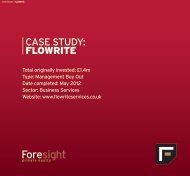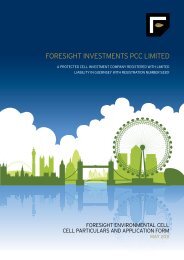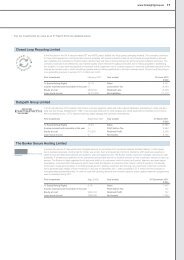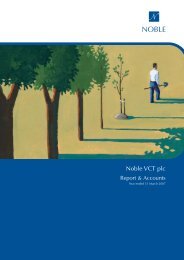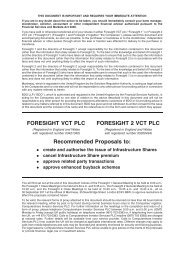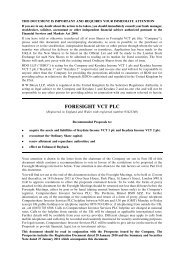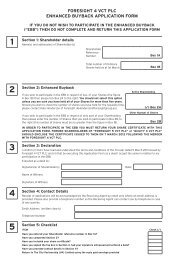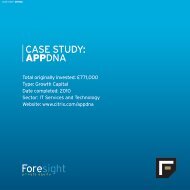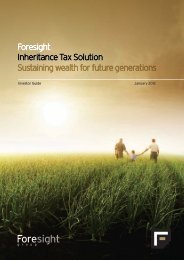FORESIGHT 4 VCT PLC - Foresight Group
FORESIGHT 4 VCT PLC - Foresight Group
FORESIGHT 4 VCT PLC - Foresight Group
Create successful ePaper yourself
Turn your PDF publications into a flip-book with our unique Google optimized e-Paper software.
The existing Shares have been (and it is anticipated that the New Shares in the Enlarged Company to be<br />
issued pursuant to the Schemes will be) admitted to the premium segment of the Official List and are (or<br />
will be) traded on the London Stock Exchange’s market for listed securities. However, the secondary<br />
market for <strong>VCT</strong> shares is generally illiquid (which may be partly attributable to the fact that initial tax<br />
reliefs are not available for <strong>VCT</strong> shares bought in the secondary market and because <strong>VCT</strong> shares<br />
usually trade at a discount to NAV) and Shareholders in the Enlarged Company may find it difficult to<br />
realise their investment. An investment in the Enlarged Company should, therefore, be considered as a<br />
long-term investment.<br />
Whilst it is the intention of the Board that the Enlarged Company will continue to be managed so as to<br />
qualify as a <strong>VCT</strong>, there can be no guarantee that such status will be maintained. Failure to continue to<br />
meet the qualifying requirements could result in Shareholders in the Enlarged Company losing the tax<br />
reliefs available for <strong>VCT</strong> shares, resulting in adverse tax consequences including, if the holding has not<br />
been held for the relevant holding period, a requirement to repay the tax reliefs obtained. Furthermore,<br />
should the Enlarged Company lose its <strong>VCT</strong> status, dividends and gains arising on the disposal of Shares<br />
in the Enlarged Company would become subject to tax and the Enlarged Company would also lose its<br />
exemption from corporation tax on its capital gains.<br />
The tax rules, or their interpretation, in relation to an investment in the Enlarged Company and/or the<br />
rates of tax may change during the life of the Enlarged Company and may apply retrospectively which<br />
may affect tax reliefs obtained by Shareholders in the Enlarged Company and the <strong>VCT</strong> status of the<br />
Enlarged Company.<br />
Changes in legislation concerning <strong>VCT</strong>s (pursuant to the consultation document published by HM<br />
Treasury on 6 July 2011, as announced in the 2011 Autumn Statement or otherwise), in relation to what<br />
constitutes qualifying holdings and qualifying trades, may limit the number of qualifying investment<br />
opportunities, reduce the level of returns which might otherwise be achievable or result in the Company<br />
not being able to meet its objectives.<br />
If a Shareholder in the Enlarged Company disposes of his or her Shares in the Enlarged Company within<br />
five years of issue (three years if such Shares were issued on or between 6 April 2000 and 5 April 2006),<br />
he or she will be subject to clawback by HMRC of any income tax reliefs originally claimed. For these<br />
purposes, the date of issue of the New Shares in the Enlarged Company issued pursuant to the<br />
Schemes will be the original date of issue of the relevant Target <strong>VCT</strong>’s Shares in respect of which such<br />
New Shares in the Enlarged Company are issued. Any realised losses on the disposal of Shares in the<br />
Enlarged Company cannot be used to create an allowable loss for capital gains tax purposes.<br />
Investment in unquoted companies (including AIM-traded and PLUS market-traded companies), by its<br />
nature, involves a higher degree of risk than investment in companies listed on the Official List, which<br />
could result in the value of such investment, and interest income and dividends therefrom reducing. In<br />
particular, small companies often have limited product lines, markets or financial resources and may be<br />
dependent for their management on a small number of key individuals and may be more susceptible to<br />
political, exchange rate, taxation and other regulatory changes and may not produce the hoped-for<br />
returns. In addition, the market for securities in smaller companies is less regulated and is usually less<br />
liquid than that for securities in larger companies, bringing with it potential difficulties in acquiring, valuing<br />
and disposing of such securities. Full information for determining their value or the risks to which they are<br />
exposed may also not be available. Investment returns will, therefore, be uncertain and involve a higher<br />
degree of risk than investment in a company listed on the Official List.<br />
Realisation of investments in unquoted companies may be difficult and may take considerable time.<br />
There may also be constraints imposed on the realisation of investments in order to maintain the <strong>VCT</strong><br />
tax status of the Enlarged Company which may restrict the Enlarged Company’s ability to obtain<br />
maximum value from its investments. In addition, although the Enlarged Company may receive<br />
customary venture capital rights in connection with some of its unquoted investments, as a minority<br />
investor it may not be in a position to fully protect its interests.<br />
8



